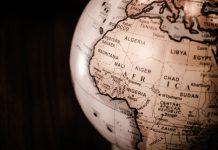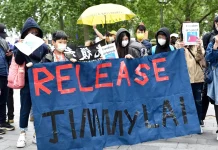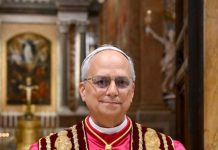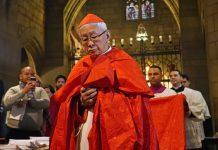The ‘Cardinal Becciu’ incident keeps expanding, in mass and sensationalism.

Newsroom (October 8, 2020 9:10 am Gaudium Press) — The ‘Cardinal Becciu’ incident keeps expanding, both in mass and sensationalism. Casual observers, however, need to keep a cool head to avoid falling victim to bias and prejudice.
Since yesterday, headlines have been rattled again by another bomb. Some eye-catching, yellow press style journalism has already nicknamed the new episode as the ‘Vatican Matahari’ affair.
The main character in the story is Cecilia Marogna, an Italian, who owns a company – the Logsic, D.O.O. – based in Slovenia. The modest republic although small still holds many connections and ties to Italy.
Marogna, 39, admits having received between 500,000 and 600,000 euros from the Vatican Secretariat of State, for a period of 4 years, in money transfers managed by Cardinal Angelo Becciu. Until recently, Becciu was the prefect of the Congregation for the Causes of Saints.
The suspicions deepen greatly based on some eye-catching factors: Cecilia Marogna comes from Sardinia, like the Cardinal and the euros were spend on expensive Prada and Chanel purses, as well as other luxury items.
Marogna on the defensive
“I do my job well and always maintain discretion and confidentiality,” Marogna told the Italian newspaper Domani.
And what was this job about? Building “high-level networks” in countries at risk including areas such as the Middle East and Africa.
“I made a mapping of the missions, of the most remote dioceses. A job that the Vatican had never done: the nunciatures certainly do not report on geopolitics or analysis of data on the territory,” she affirms. Her claims could be expressed in better terms, since good diplomats, as surely nuncios happen to be, should be well aware of their surroundings, not only in the religious field but also in the political, economic, and cultural domains. ‘Mapping the missions’, after all, should not be such a complex task.
As per the Chanel purses, “they were used to create cooperative relationships,” she asserts.
“We are talking about a few hundred thousand euros spent in over four years,” said Marogna. “And the wire transfers my company received from the Vatican also included my salary. It’s not like I’m a missionary, sorry? Will I be able to get paid for the work I’ve done? Between travel and various payments, how much money could I have kept for myself? Think about it, come on…” she insists.
She alleges that her car is 10 years old and that she lives in a rented apartment. Marogna assures that she did not get rich from the operation.
Questioned whether the money she received was used to pay for the release of kidnapped clergymen, she admits to being “aware of those situations. I may have had sensitive information about this, but it’s not like I was going to the terrorists to take the hostage. I can speak with intermediaries to try to resolve situations. But I can also tell you that Becciu and I weren’t the only ones running certain businesses”. She denies that the money was used for ransom payments.
In short, her statements aim to explain and justify her role. However, they seem to imply that ‘certain businesses’ were run by other Vatican figures presently lurking behind the scenes. Unquestionably, her clarifying efforts appear to fall short; namely, in an environment where Catholic opinion remains hyper-sensitive at how the poor and the widows’ money is spent. They deserve, as the Secretary for the Economy of the Holy See said recently, that procedures stay transparent as crystal-clear water.
All in all, these topics will continue to feed the ongoing judicial inquiry on Cardinal Becciu’s administration. (SCM)
(With information from The Boston Pilot)




































